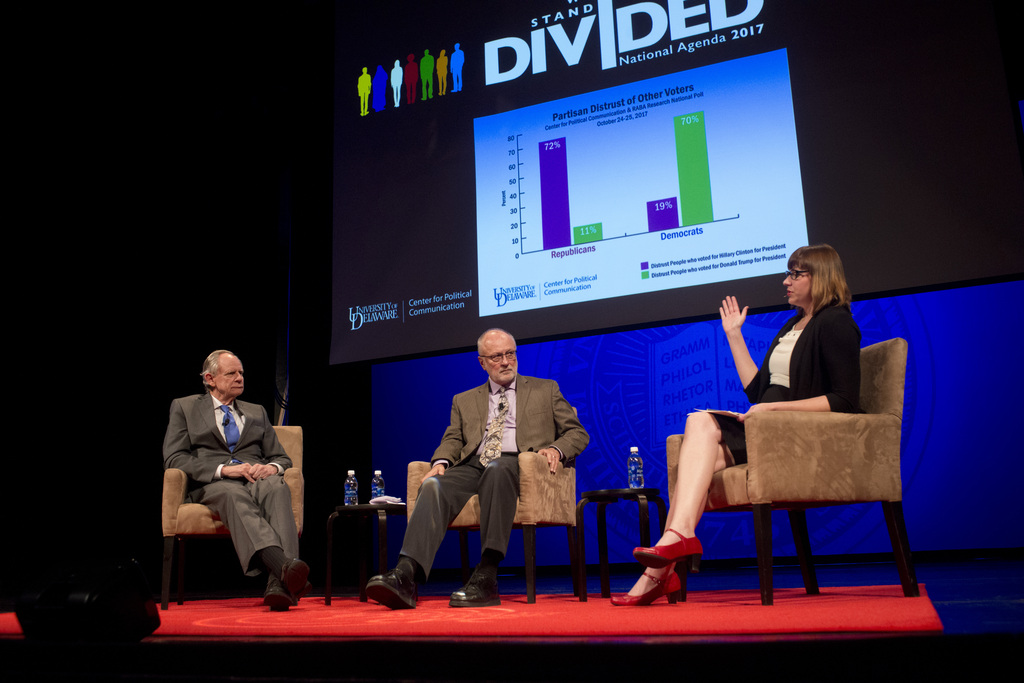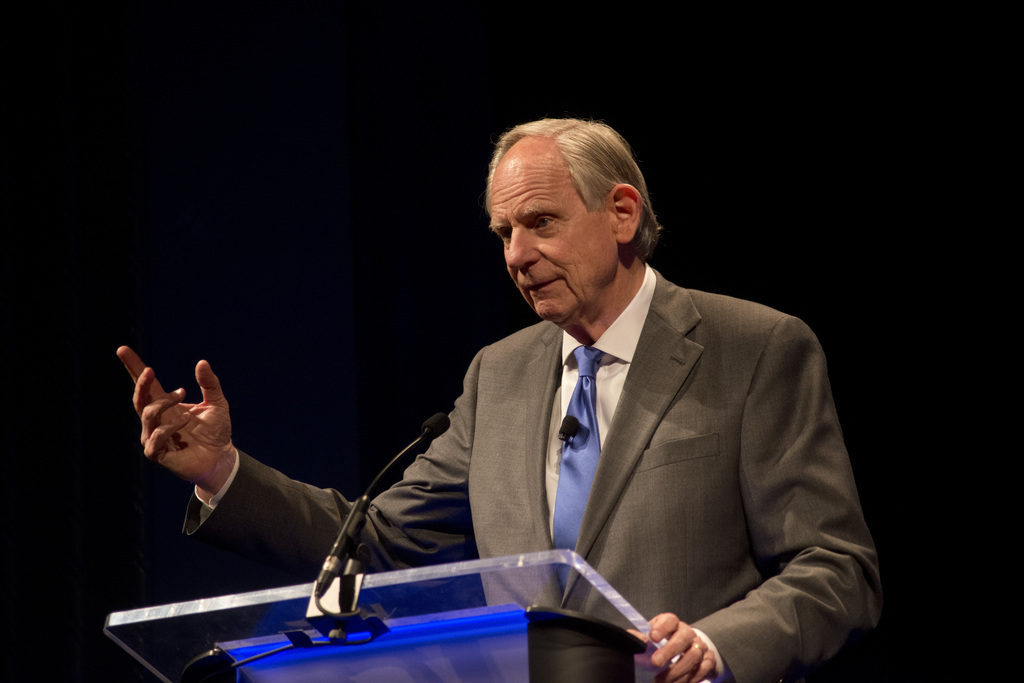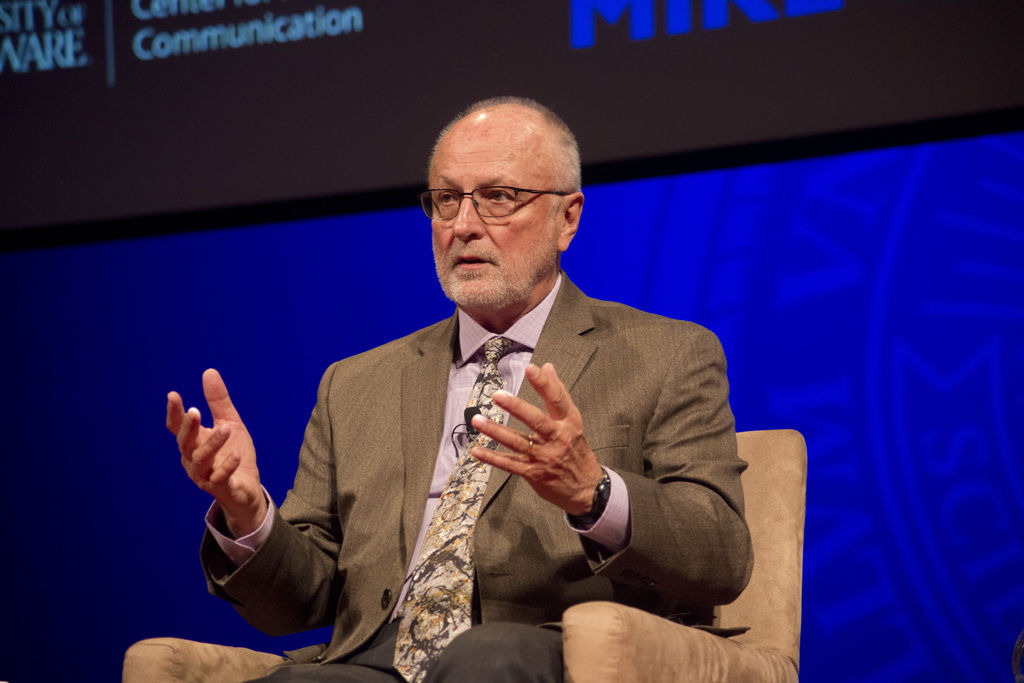Overcoming Political Divides
Find common goals, say political leaders
Watch the video. Listen to the podcast. Read and download the transcript. Read the UDaily story.
NOVEMBER 6, 2017 – The University of Delaware’s National Agenda speaker series continued on November 1 with a conversation about past and present political divides with former Michigan Congressman David Bonior and former Delaware Governor and Congressman Mike Castle. The statesmen recalled their challenges and accomplishments while in office and discussed challenges facing America today.
The Center for Political Communication hosts the National Agenda speaker series to promote civic engagement and civil discourse. Guest speakers for the fall series, entitled “As We Stand | Divided,” have explored the many divides that exist in the United States, including gender, geographic, religious, partisan, and cultural.
David Bonior, who served as a U.S. Representative from 1976 to 2002 and as the Democratic whip from 1991 to 2002, praised the distinguished career of Mike Castle. “In Congress, he was a highly respected moderate, whose reasoned approach on controversial issues like gun restrictions, stem cell research, and LGBT rights was a breath of fresh air. He was a courageous Republican in a Congress that was more and more leaning to the far right.”
American citizens have lost confidence in the government, said Bonior. “Our democracy is suffering from a lack of honesty and courage.” Bonior suggested three policy changes to restore public confidence in the government. He recommended that Congress reform the Electoral College system to ensure that presidents are elected by national popular vote. He recommended that Congress overturn the 2010 Citizens United decision by the Supreme Court, which laid the groundwork for the opaque campaign spending practices of super PACs. Congress should also reform unfair gerrymandering practices and establish competitive legislative districts.

Mike Castle, a Republican who served as Delaware’s governor from 1985 to 1992 and as the U.S. Representative for Delaware’s at-large congressional district from 1993 to 2011, reflected on his years of service. “Being in Congress was at times difficult, trying, and rewarding. I strived to vote the conscience of Delaware.”
Both Bonior and Castle agreed that gerrymandering practices in the U.S. are a big problem. Bonior said, “Gerrymandering has allowed the people who are drawing the lines, the legislators in these respective states, to draw districts that are overly protective, thereby creating a dynamic in all states where you don’t have very many competitive seats – Only 10 % of the seats are competitive today.”
“I think that gerrymandering is a great problem,” said Castle. In a district that is gerrymandered to be predominantly Republican or Democrat, people will cast their votes as directed by their political party. Candidates worry more about primary results than about the general elections. “As a result, [political leaders] are less willing to sit down and work on the difficult problems facing America which quite candidly involve Republicans and Democrats pulling together. And that simply doesn’t happen in certain circumstances.”
“My judgment is that the whole idea of an independent group making these decisions of drawing district lines would make for better politics in the United States of America,” said Castle.

With overlapping terms of service, the two political leaders sometimes collaborated on projects. “In working together we ended up on the same side,” said Castle. “We were not in each other’s face. We listened to each other and gave each other the opportunity.”
“Mike was a [policy] leader in stem cell research and I supported that research and its importance,” said Bonior.
Both Bonior and Castle agreed that it is important for young people to be civically engaged. Dr. Hoffman’s National Agenda class “is a wonderful example of good bright young people asking highly intelligent questions and being very engaged – I don’t know the politics of those individuals but I know they are interested – It’s simple to get involved. Just go to your local campaign headquarters,” said Castle. “We need to educate young people on civics of states and towns so they have an abiding and continuing interest.”

“You can’t start too young,” said Bonior. As a member of the advisory board of the Mikva Challenge in Washington, D.C., he works to engage students in civic action. “We brought 120 kids from Chicago and D.C. to participate in the Iowa Caucus, where they were exposed to political professionals and candidates. On election day in D.C., they worked in polling places. Civic action programs are invaluable. In follow-up surveys when tested against peer groups, they continued to stay more involved.”
Recent national polls have revealed strong partisan divides among Americans, but Bonior and Castle said that it is possible to overcome the divides by working together on common goals. “Start with the basics,” said Bonior. “We are all human beings. We have more in common than we don’t have in common. We get up in the morning, we have families, we go to work. We want good schools, safe neighborhoods, safe highways, decent infrastructure, whether we are Democrats or Republicans. We all want that.”
Now in its seventh year, National Agenda is free and open to the public and brings nationally known speakers to campus. The final National Agenda event on November 15 features comedian Chris Garcia on “Cultural Divides.” National Agenda is made possible with support from the University of Delaware Office of the Provost.
